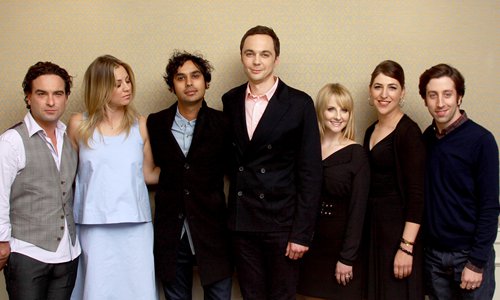HOME >> ARTS
Chinese fans bid farewell to ‘The Big Bang Theory’
By Chen Xi Source:Global Times Published: 2019/6/3 18:08:39

From left: Big Bang Theory cast members Johnny Galecki, Kaley Cuoco, Kunal Nayyar, Jim Parsons, Melissa Rauch, Mayim Bialik and Simon Helberg Photo: IC
"In my way, I love you all."
Sheldon's final speech to his long-suffering friends during the final episode of the long-running The Big Bang Theory caused many fans in China to shed tears of joy.
"I have been following this drama for 12 years. It accompanied me through my youth. Sheldon, I am also one of your friends and I'm gonna miss you," the drama's fan Han Yujian, a 26-year-old primary school English teacher living in Beijing, told the Global Times.
"No more 'bazinga,' no more 'Soft Kitty.' I can't believe that The Big Bang Theory has truly ended. Tears were running down my face when Sheldon said those touching words to his good friends," Liu Zhiying, a master's student at Beijing Foreign Studies University, told the Global Times.
Two classics
If Friends was the introduction to US TV series for many Chinese, then The Big Bang Theory should be considered the climax. Both classic comedy sitcoms, the two shows have much in common.
Friends, one of the most popular TV shows in the US, ranks at No.21 on TV Guide's 50 Greatest TV Shows of All Time and won the Outstanding Comedy Series award in 2002 for its eighth season while also getting 62 nominations for the Primetime Emmy Awards.
The Big Bang Theory, meanwhile, has won 10 Emmy Awards, four of them for Jim Parsons role as quirky theoretical physicist Sheldon Cooper.
The two successful TV series have similar characters dynamics, such as Friends' will-they-won't-they couple Ross and Rachel and the romance of Big Bang's Penny and Leonard - a pretty woman who used to work as a waitress and a nerdy male scientist.
While Leonard and Sheldon's apartment on The Big Bang Theory has far more comic book-related decorations than Monica and Rachel's home on Friends, the living rooms on both shows are the main place where the characters like to sit around and hang out.
Most importantly, they both had happy endings.
"Compared to the terrible ending of Game of Thrones, I am so pleased that The Big Bang Theory did not disappoint me, just like the ending of Friends," Liu said.
According to Liu, while "character growth" is often touted as the golden standard for screenwriting because it helps keep long-running shows fresh, The Big Bang Theory broke the mold because the "naivety" of the four science geeks on the show was the most hilarious part of the sitcom.
"Ending the show in the 12th season was probably not a bad idea because the four science monsters still behave like children. I would have hated to see the four boys become more normal and mature, it would have made the show seem like a soap opera," said Han.
Smart is the new sexy
The Big Bang Theory also stands out from Friends in the way it injected geek and nerd culture into the series.
The first season debuted in 2007. The audience's love of characters such as Sheldon suggested a change in culture in which smart socially awkward people who were once shunned by mainstream society were finding acceptance.
Another key to the show's global success is the way it told the story of a unique group of people.
"I didn't like this TV series at first, especially the role of Sheldon because I have never seen anyone with such high intelligence but low emotional intelligence. I thought he was like a giant baby and too weird. But later, I started to like him. He is very cute, and he has a group of friends who are tolerant of him. It would be wonderful to have a friend like Sheldon in real life," Chinese netizen Silly-cee posted on Sina Weibo.
"The Big Bang Theory changed my opinion toward geeks. I didn't want to be friends with them because I thought they were too odd and boring. I was so surprised to see that they have their own social circles and can make life so interesting and colorful. I might get in touch with some geeks around me," another netizen posted.
The new normal
Nerds are usually described as obsessive, overly intellectual people who lack social skills. This is also pretty much the description of the four main characters in the show.
They are stereotypical scientists who love studying subjects that are far beyond the understanding of most people. Living in their own small circle, they are shy and sensitive, but are also full of courage and possess a strong sense of justice.
Most of the humor of the show comes because the audience looks at this world of nerds through the lens of "common sense" and a "normative" view of the world. It is the difference between these two world views or way of thinking that shaped the show.
Alienated characters, usually the least likely to gain empathy, ended up requiring extra attention from the audience and become the center of the story.
"China is becoming more open to the world's various cultures. No matter if it is geek culture or nerd culture, we welcome more unique TV series and look forward to the next classic TV show," said Liu.
Newspaper headline: Friends like these
Posted in: TV,CULTURE & LEISURE